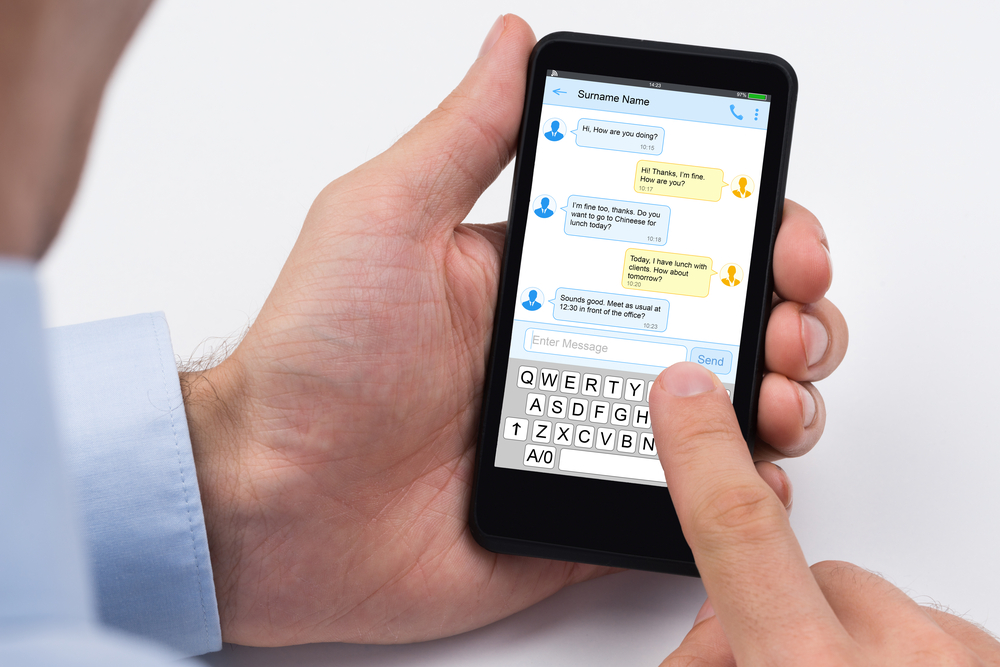Admissibility of Text Messages

In today’s world, we text. We text a lot! In many instances, we text more than we e-mail or talk on the phone to a specific person. At trial, no different than letters or e-mails, texts need to be authenticated for purposes of admissibility. If you want to use text messages at trial, you need to authenticate those texts.
In Walker v. Harley-Anderson, 45 Fla. L. Weekly D2116a (Fla. 4th DCA 2020), the sole issue in this appeal was the admissibility of text messages. This case involved an injunction to prevent stalking. The petitioner moving for the injunction claimed the respondent sent her threatening text messages. At the final evidentiary hearing, the petitioner testified she did not know the respondent other than that the respondent had a relationship with the petitioner’s nephew that fell apart. As a result, the petitioner claimed she received many threatening text messages, which were offered into evidence. The respondent objected to the text messages claiming she did not recognize the phone numbers that sent the messages and further testified she did not send them. However, the trial court entered an injunction against the respondent ruling that the texts most likely came from the respondent because no alternative was provided. The respondent appealed the injunction arguing the trial court erred in admitting the texts.
An appellate court reviews a trial court’s determination regarding the authentication of evidence under an abuse of discretion standard of review. Walker, supra.
On appeal, the Fourth District Court of Appeal agreed that the trial court abused its discretion because the text messages were NOT property authenticated with a very good discussion pertaining to the authentication and admissibility of texts:
“In determining whether the evidence submitted is sufficient for this purpose [of authentication], the trial judge must evaluate each instance on its own merits, there being no specific list of requirements for such a determination.” “Evidence may be authenticated by appearance, content, substance, internal patterns, or other distinctive characteristics taken in conjunction with the circumstances. In addition, the evidence may be authenticated either by using extrinsic evidence, or by showing that it meets the requirements for self-authentication.”
“Testimony that a person received a text or email from another is not sufficient, by itself, to authenticate the identity of the sender.” Other factors can circumstantially authenticate the text.
“Circumstances recognized as sufficient to meet the test of authenticity include when a letter is written disclosing information which is likely known only to the purported author.”
[In this case, o]utside of a few references in the messages to the name of appellant’s boyfriend, the nephew of the appellee, and a reference to “aunty” there are no clues as to who sent the messages or what they are about. The discord between the nephew and appellant appears to be well known between the two families. The first five pages of texts offered by appellee are dated January 1, and appellee testified that the year was 2019. These texts purportedly come from three different phone numbers. None of the phone numbers match the phone numbers on appellant’s phone bill. Appellee did not testify that she recognized any of the numbers on the texts. Their substance generally refers to the nephew and threats to kill him but is populated with the pronoun “we” and not “I” indicating that multiple people are involved in these threats. One of the messages refers to appellant in the third person, indicating that it was sent from someone other than appellant.
As noted by the court, the last five pages of texts look different than the first five pages of texts. None of these texts are dated. Only the first two pages of the photographs of the text messages have origination phone numbers. Neither of the origination phone numbers match appellant’s phone numbers on her bill. The remaining pages of text messages show only a day of the week and time, no origination phone number. In this group of texts, there is no mention of the nephew or of details known only to the appellant. In fact, one of the messages seems to convey that the sender has been wronged by a woman, not the nephew.
To summarize, the contextual clues in the texts are insufficient to provide authentication that these texts were sent by appellant. The messages do not contain any information which would have been known only to the appellant. The direct evidence is insufficient as well. The messages do not show appellant’s telephone number as sender.
As the proponent of admission of the evidence, it was the [the petitioner’s] burden to prove the authenticity of the text messages as being sent by [the respondent]. Thus, the trial court’s rationale that no other explanation for the messages was offered placed on [the respondent] the obligation of disproving their authenticity. This was error.
“[A]uthentication for the purpose of admission is a relatively low threshold that only requires a prima facie showing that the proffered evidence is authentic[.]” Even so, the instant case lacks the “distinctive characteristics”…or the contextual clues …. The text messages were not obtained pursuant to a search warrant from [the repsondent’s] phone, and no circumstantial support shows [the respondent] to be the author of the texts ….
The [petitioner] failed to make a prima facie showing of authenticity, i.e. that the text messages were what [the respondent] claimed — messages authored by [the respondent]. Accordingly, the trial court abused its discretion in admitting the text messages into evidence.
Walker, supra (internal citations omitted).
Please contact David Adelstein at [email protected] or (954) 361-4720 if you have questions or would like more information regarding this article. You can follow David Adelstein on Twitter @DavidAdelstein1.




